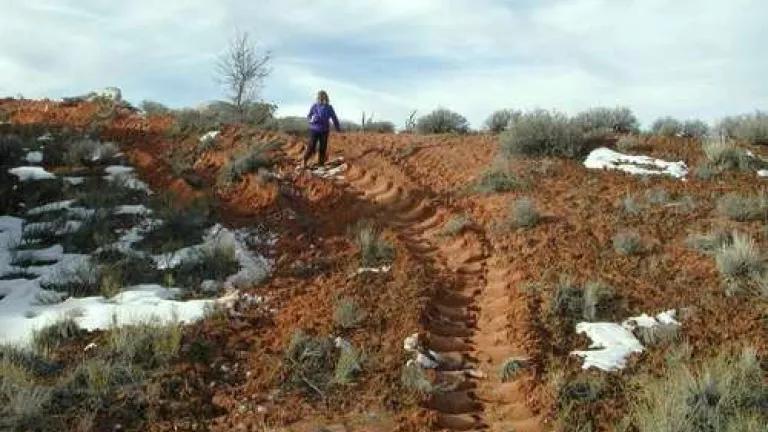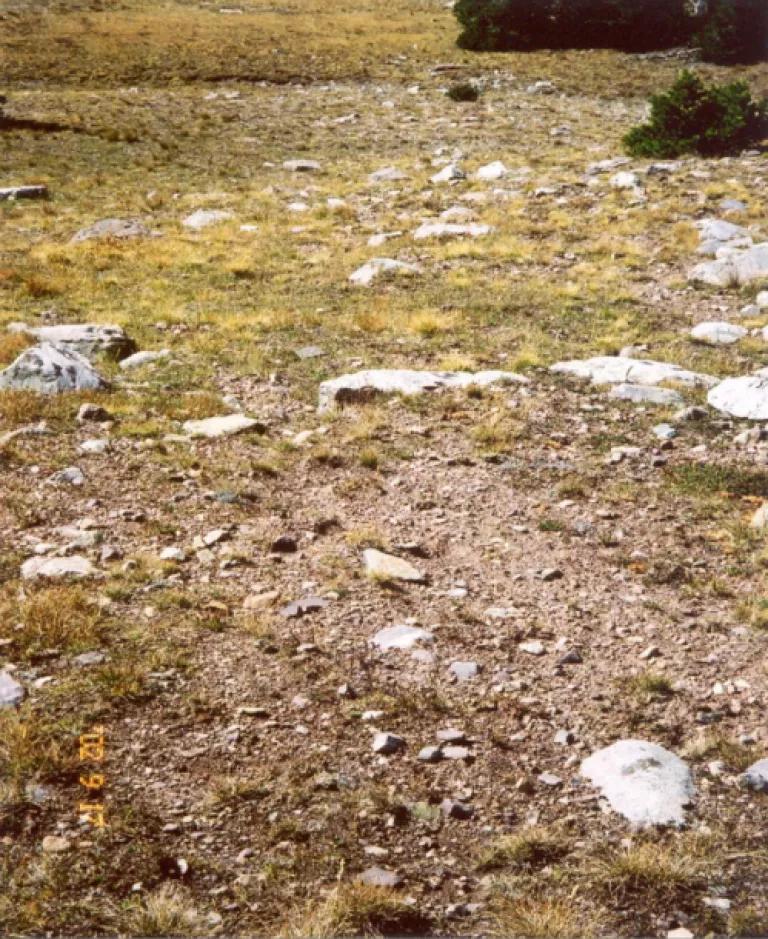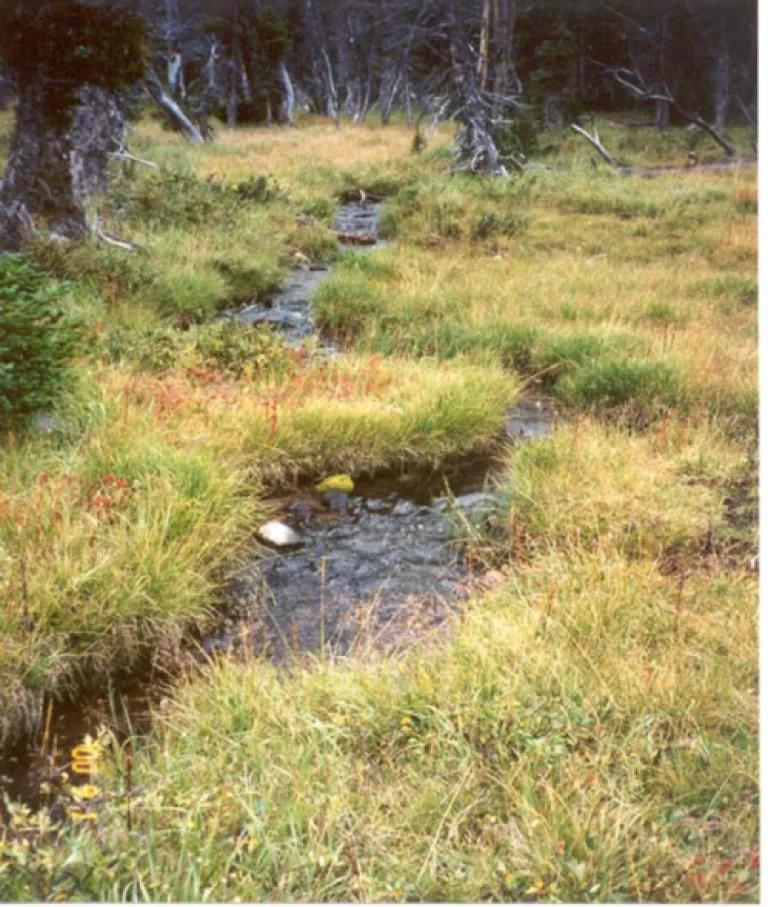
Above: The aftermath of a 55,000 pound oil and gas exploration vehicle, or "Thumper Truck," that left deep ruts in the fragile Utah desert – damage that will take centuries to repair. In 2002, NRDC and its partners successfully sued the BLM to further halt this illegal and destructive activity in the area. If House legislators have their way, the public’s ability to petition the government to prevent such incidents would be eliminated. (Photo Credit: Southern Utah Wilderness Alliance)
The House of Representatives is scheduled to vote this week on the “Red Tape Reduction and Small Business Job Creation Act" (H.R. 4078) – a bill that, among other things, imposes a moratorium on issuing virtually any new regulations as long as unemployment remains above 6%, regardless of the substance of such regulations or support for them. In this package is a piece of legislation called the "Rapid Act" (H.R. 4377) that would steamroll the environmental review process by basically handing the environmental review and decision process over to developers while eliminating the public’s roll – the proverbial fox guarding the henhouse.
The National Environmental Policy Act (NEPA) plays a critical role in ensuring that projects are carried out in a transparent, collaborative, and responsible manner. NEPA simply requires federal agencies to assess the environmental impacts of proposals, solicit the input of all affected stakeholders, and disclose their findings publicly. Based on some of the following provisions, the proposed NEPA "reforms" in the RAPID Act will significantly undermine this bedrock environmental law:
- Place Arbitrary Limitations for Environmental Review - the Rapid Act mandates that decisions must be made on NEPA documents no matter how flawed they may be and how inaccurate the information is before the agency; this completely ignores situations where there are new developments or information which would make the document seriously inadequate, typically requiring the preparation of supplemental material.
- Severely Limit Consideration of Alternatives - the legislation would diminish the alternatives analysis, the "heart of the NEPA process," by restricting the range of alternatives considered.
- Create a Presumption of Project Approval - mandates a presumption that projects must be approved, even when there might be demonstrable impacts on the health, economy, and environment of communities - thus completely undermining NEPA's goal of informed decision-making and the agency’s role of acting in the public interest. Once an agency runs up against the bill's arbitrary deadlines for a project analysis, no matter how bad the project might be, the government will be forced to approve a proposed project.
- Limit Public Participation - unnecessarily reduces the public comment period from 45 to 30 days.
- Lead to Unanticipated Delays - unclear statutory language and severe restrictions on judicial review will force stakeholders into court preemptively simply to preserve their right to judicial review.
The provisions in the RAPID Act will only serve to increase delay and confusion around the environmental process. We believe compromising the quality of environmental review and limiting the role of the public is the wrong approach. A far more sensible approach that would improve the efficiency of the process is to urge agencies to use the existing, but underused, flexibilities that exist within NEPA, and were subsequently detailed only months ago by the Council on Environmental Quality (CEQ). This guidance released by CEQ, "Improving the Process for Preparing Efficient and Timely Environmental Reviews Under NEPA," provides additional measures that can be implemented to ensure that an environmental review process can be conducted in a timely and efficient manner.
Far from being broken, the National Environmental Policy Act has proven its worth as an invaluable tool to ensure that the public, developers, and agencies have an agreed upon template that consistently and fairly assesses proposals that may impact federal resources. The RAPID Act contradicts and jeopardizes decades of experience gained from enacting this critical environmental law. Further, the House proposal tips the balance away from informed decisions, jeopardizing the public's right to participate in how public resources will be managed.
If recent history is any guide, past Congressional experiments in watering down NEPA have resulted in some very unfortunate outcomes. For example, in 2005 Congress granted the Forest Service the authority to issue 900 waivers, or “categorical exclusions” for the renewal of federal livestock grazing permits. Congressional backers extolled this program as a common sense approach to ensure that good actors were rewarded with quick renewals, while freeing up limited agency resources to concentrate on grazing permits that needed additional environmental analysis. But such good intentions did not last...within weeks of being granted the authority, the Forest Service rapidly handed out hundreds of categorical exclusions to some of the worst actors, granting waivers to individual grazing operations that would have been otherwise challenged to muster a passable environmental review due to past bad practices. By the second year of the program (for a program that lasted five years), the Forest Service had excluded from environmental review almost two million acres of grazing in designated wilderness alone – lands that deserved the greatest of protections given their pristine nature. There were some individual National Forests in the West where nearly all of the livestock grazing that took place in these forests were exempted – amounting to millions of additional acres. The temptation to abuse the program by federal livestock permittees and the Forest Service was simply too great, and there was practically nothing that could be done by the public quickly and efficiently to redress these decisions given that the legislation locked the public out of its traditional stakeholder role. Years later, we are still seeing the impact of these categorical exclusions, with millions of acres of wildlife habitat permanently damaged – lands that previously harbored such key species as endangered spawning salmon and critically stressed sage-grouse populations.

Above: The East Fork Black’s Fork grazing allotment in the Uintas Wilderness of Utah. Grazing impacts were so severe that the spring depicted in the image no longer functioned as a spring. Despite evidence of substantial environmental degradation, the Wasatch-Cache National Forest found this allotment to be meeting ecological standards and issued it a categorical exclusion, exempting the grazing permit from further environmental analysis under NEPA. Below: An ungrazed stream in the Uintas Wilderness found only two miles from the East Fork allotment, in contrast, this range represents a fully functioning wilderness setting. (Photo Credits: Dr. John Carter, Western Watersheds Project)

The program to exempt Forest Service grazing from NEPA was just one isolated initiative that favored one politically connected industry, but the negative impacts of that five-year “experiment" have been far-reaching and permanent. Compare that with what is being proposed by the House, which would replicate these short circuited approaches across the entire federal system. If H.R. 4078 were to pass, it would stop action on ALL pending safeguards, resulting in hundreds of thousands of preventable deaths and injuries annually and the destruction of our most iconic lands and wildlife. The inclusion and passage of the RAPID Act is a radical attempt to undermine one of our most important environmental safeguards.

